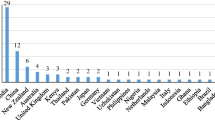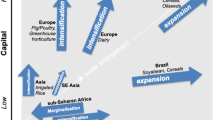Abstract
As a result of the complexity of agri-food systems, popularly-supported ‘win-win’ solutions rarely result in wholly satisfactory outcomes. We draw on documented cases of the introduction of agricultural input subsidies; the intensification of livestock production; and the development of genetically modified crop varieties as examples of agri-food systems in which there are multiple interconnected sustainability priorities and inevitable conflicts. Generic or narrowly conceived goals may not fully reflect the multiple and conflicting dimensions of sustainability that are relevant to such cases. There is a need to advance established multiple-win agendas, such as sustainable intensification and climate smart agriculture, to more fully reflect this complexity. We propose the use of the sustainability space concept for defining and monitoring sustainability priorities that might become the basis for effective management of complex systems. We further outline the challenge of defining and monitoring these priorities, which will require carefully designed, interdisciplinary and participatory research agendas.


Similar content being viewed by others
References
Ashton, J. R., Middleton, J., & Lang, T. (2014). Open letter to prime minister David Cameron on food poverty in the UK. The Lancet, 383, 1631.
Childers, D. L., Corman, J., Edwards, M., & Elser, J. J. (2011). Sustainability challenges of phosphorus and food: solutions from closing the human phosphorus cycle. BioScience, 61, 117–124.
Chinsinga, B. (2011). Seeds and subsidies: the political economy of input programmes in Malawi. IDS Bulletin, 42, 59–68.
Conway, G. (2000). Genetically modified crops: risks and promise. Conservation Ecology, 4, 2.
Darnhofer, I., Gibbon, D., & Dedieu, B. (2012). Farming Systems Research: an Approach to Inquiry. London: Springer.
Denning, G., Kabambe, P., Sanchez, P., Malik, A., Flor, R., Harawa, R., Nkhoma, P., Zamba, C., Banda, C., Magombo, C., Keating, M., Wangila, J., & Sachs, J. (2009). Input subsidies to improve smallholder maize productivity in Malawi: toward an African green revolution. PLoS Biology, 7, e23.
Dorward, A., & Chirwa, E. (2011). The Malawi agricultural input subsidy programme: 2005/06 to 2008/09. International Journal of Agricultural Sustainability, 9, 232–247.
Folke, C. (2006). Resilience: the emergence of a perspective for social-ecological systems analyses. Global Environmental Change, 16, 253–267.
Godfray, H. C. J. (2015). The debate over sustainable intensification. Food Security, 1–10.
Godfray, H. C. J., Beddington, J. R., Crute, I. R., Haddad, L., Lawrence, D., Muir, J. F., Pretty, J., Robinson, S., Thomas, S. M., & Toulmin, C. (2010). Food security: the challenge of feeding 9 billion people. Science, 327, 812–818.
Goodman, R. E., Vieths, S., Sampson, H. A., Hill, D., Ebisawa, M., Taylor, S. L., & Van Ree, R. (2008). Allergenicity assessment of genetically modified crops[mdash]what makes sense? Nature Biotechnology, 26, 73–81.
Harvey, F. (2013). UK needs ‘mega farms’ to keep food prices down, say experts. The Guardian.
Jayne, T. S., Govereh, J., Mwanaumo, A., Nyoro, J. K., & Chapoto, A. (2002). False promise or false premise? The experience of food and input market reform in Eastern and Southern Africa. World Development, 30, 1967–1985.
Mouysset, L., Doyen, L., & Jiguet, F. (2014). From population viability analysis to coviability of farmland biodiversity and agriculture. Conservation Biology, 28, 187–201.
Neufeldt, H., Jahn, M., Campbell, B. M., Beddington, J. R., Declerck, F., de Pinto, A., Gulledge, J., Hellin, J., Herrero, M., & Jarvis, A. (2013). Beyond climate-smart agriculture: toward safe operating spaces for global food systems. Agriculture & Food Security, 2, 12.
Petersen, B., & Snapp, S. (2015). What is sustainable intensification? Views from experts. Land Use Policy, 46, 1–10.
Pretty, J. (2008). Agricultural sustainability: concepts, principles and evidence. Philosophical Transactions of the Royal Society, B: Biological Sciences, 363, 447–465.
Raworth, K. (2012). A safe and just space for humanity: can we live within the doughnut. Oxfam Policy and Practice: Climate Change and Resilience, 8, 1–26.
Reed, M. S. (2008). Stakeholder participation for environmental management: a literature review. Biological Conservation, 141, 2417–2431.
Rockström, J., Steffen, W., Noone, K., Persson, Å., Chapin, F. S., Lambin, E. F., Lenton, T. M., Scheffer, M., Folke, C., & Schellnhuber, H. J. (2009). A safe operating space for humanity. Nature, 461, 472–475.
Saul, H. (2013). Campaigners warn against rise of the ‘mega-farms’: could massive pig, fish and dairy units harm the environment? The Independent.
Whitfield, S. (2016). Adapting to Climate Uncertainty in African Agriculture: Narratives and Knowledge Politics. London: Routledge.
Whitfield, S., & Reed, M. (2011). Participatory environmental assessment in drylands: introducing a new approach. Journal of Arid Environments, 77, 1–10.
Whitfield, S., Dixon, J. L., Mulenga, B. P., & Ngoma, H. (2015). Conceptualising farming systems for agricultural development research: cases from Eastern and Southern Africa. Agricultural Systems, 133, 54–62.
Zulu, P., Kalinda, T., & Tembo, G. (2014). Effects of the maize input subsidy program on groundnuts production in Zambia. Journal of Agricultural Science, 6, p253.
Author information
Authors and Affiliations
Corresponding author
Rights and permissions
About this article
Cite this article
Whitfield, S., Benton, T.G., Dallimer, M. et al. Sustainability spaces for complex agri-food systems. Food Sec. 7, 1291–1297 (2015). https://doi.org/10.1007/s12571-015-0512-3
Received:
Accepted:
Published:
Issue Date:
DOI: https://doi.org/10.1007/s12571-015-0512-3




